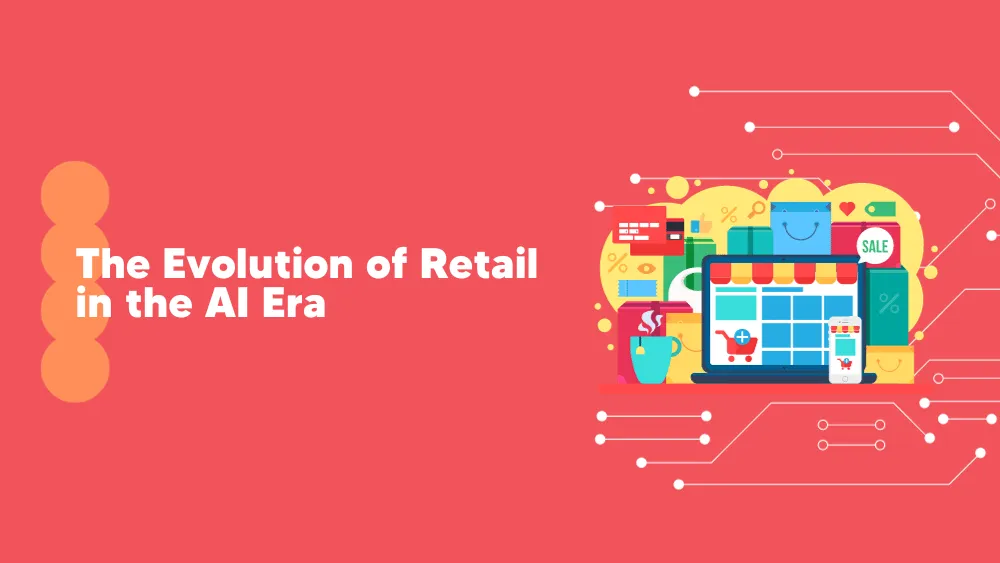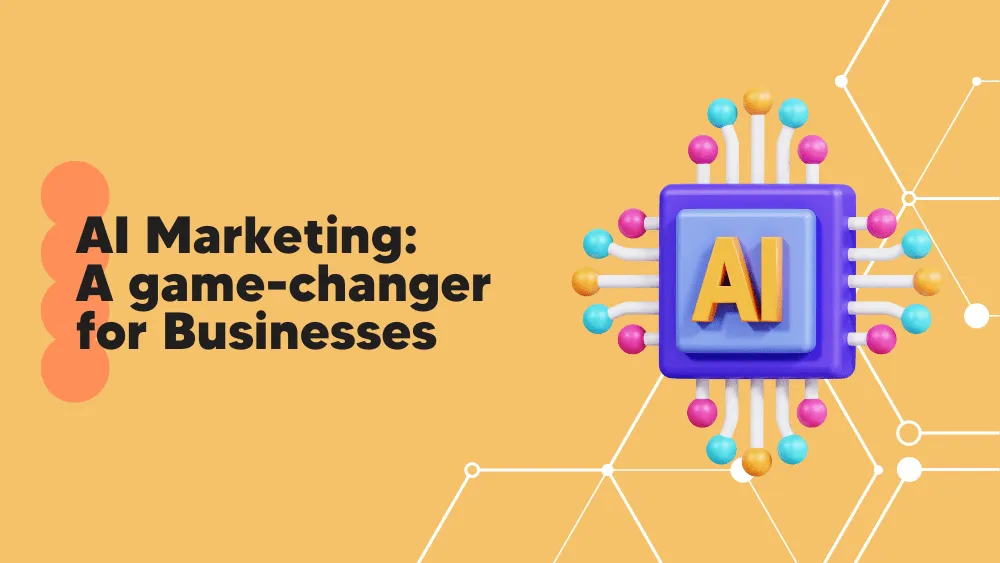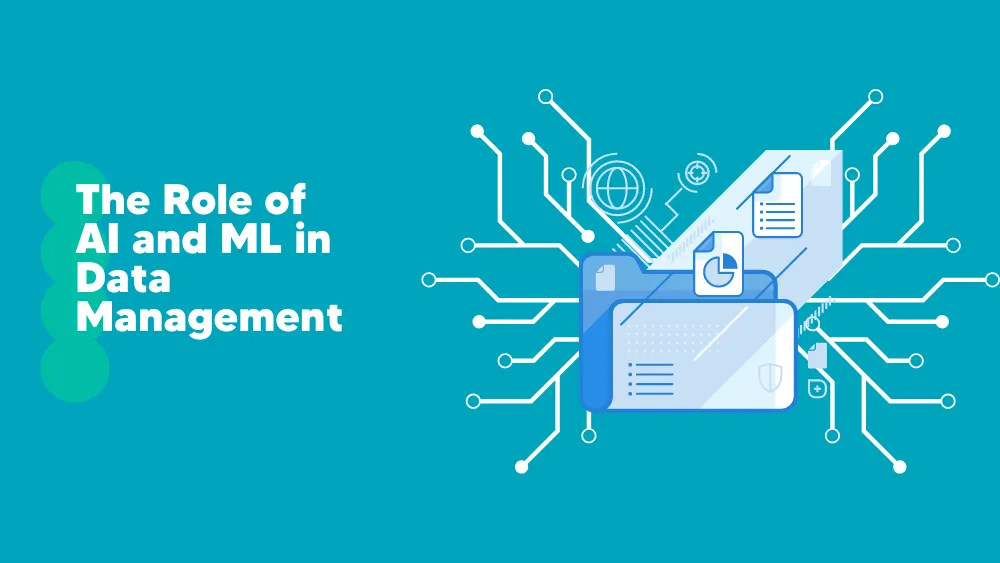From the weekend shopping sprees, the thrill of discovering new products on store shelves, and the occasional wait for your favorite items to be back in stock, shopping has taken a seismic leap. Our browsers are filled with personalized suggestions, out-of-stock scenarios are fewer, and the shopping experience? More intuitive than ever. And the brain behind all these enhancements? Artificial Intelligence.
It’s not just about slapping on some high-tech features to existing platforms. AI is diving deep, reshaping the very foundations of retail. From the uncanny accuracy of product recommendations to just-in-time inventory restocks, AI’s fingerprints are everywhere. And honestly, it’s just the beginning of the digital transformation in AI retail.
AI-Powered Hyper-Personalization in Retail
No longer are consumers just another face in the crowd. With AI, they’re in the spotlight, experiencing tailor-made shopping escapades that cater to their unique preferences and behaviors.
The Shift from One-Size-Fits-All to Individual-Centric Shopping Experiences
We’ve all felt that frustration before: browsing an online store and feeling like it just doesn’t “get” us. But they are getting smarter. With AI’s advanced algorithms and deep learning capabilities, retailers can now offer individualized experiences. This means that two shoppers on the same website could have entirely different experiences based on their past behaviors, likes, and interests. Gone are the days of generic shopping experiences; welcome to the era of digital transformation in retail where shopping feels like it’s crafted just for you.
Product Recommendations
Ever wondered why that pair of shoes you glanced at once keeps popping up in your feed, urging you to make a purchase? Or how online stores seem to know what you want even before you do? It’s all rooted in AI’s data-driven approach. By tracking browsing patterns, analyzing purchase histories, and observing online behavior, AI in retail crafts sophisticated models of each user. These models then employ techniques like collaborative filtering and content-based recommendation systems to predict and present the most appealing products. It’s not just about tempting consumers; it’s about enhancing real-time engagement, ensuring that products resonate, and ultimately driving up sales.
Tailored Marketing Campaigns
It’s not just product recommendations that are getting a personal touch. Marketing campaigns, once broad and generic, are now pinpoint precise. Thanks to AI, content personalization spans across emails, web content, and advertisements, ensuring that the message is not just heard but resonates deeply. By segmenting audiences based on AI-driven insights, retailers can target niches with incredible precision. But it’s not just about the right message; it’s about delivering it at the right moment. AI factors in timing, and optimizing campaign launches to coincide with maximum engagement potential.
Evolving Consumer Expectations
This journey with AI and consumer behavior hasn’t just changed shopping experiences; it’s reshaped what consumers expect from them. No longer are they passive receivers of information. Empowered by AI’s tailored approaches, consumers now demand more: they want intuitive interfaces that anticipate needs, platforms that respond in real-time, and above all, they seek transparency. As AI in retail becomes more integral, there’s a growing call for ethical practices, ensuring that as the retail world evolves, it remains grounded in principles of fairness and respect.
Advancements in Operational Efficiencies
The wonders of AI in retail, as well as AI in e-commerce, aren’t confined merely to the consumer-facing side. Behind the scenes, this tech marvel is busy revamping the nuts and bolts of retail operations, making them smarter, faster, vastly more efficient, and, most importantly, cheaper (According to a global AI survey, service operations and manufacturing witnessed cost decreases by 54% due to the adoption of AI technologies). It gives some usually tedious retail operations a turbo-boost, transforming processes that once were cumbersome and cost-heavy into streamlined masterpieces.
Streamlining Inventory Management
Inventory – the backbone of any retail operation. Manage it well, and you’re golden; mess it up, and, well, it’s a series of dominoes tumbling. Thanks to AI, we are witnessing the end of days of manual stock counts and best-guess replenishments. Instead, we have real-time inventory tracking systems keeping an eagle eye on every product, ensuring shelves (both physical and digital) are never bare.
But there’s more to this magic. How ai can help retailers with inventory optimization? AI-driven auto-replenishment systems ensure that stocks are replenished just in time, minimizing wastage and maximizing availability. Using predictive analytics, these systems gauge future demands, making sure that stock levels are not just sufficient but optimized. The cherry on top? Significant reductions in overhead costs. By ensuring neither too much nor too little is stocked, AI eliminates costly stockouts and overstock scenarios. Smart, isn’t it?
Revolutionizing Supply Chain Logistics
The journey of a product, from manufacturing units to store shelves, is no small feat. It’s a complex web of transportation, warehousing, and handling – a logistical dance that needs precision. AI in retail is here to choreograph that dance to perfection.
“Successfully implementing AI-enabled supply-chain management has enabled early adopters to improve logistics costs by 15 percent”
Think of transport route optimization. Instead of sticking to traditional routes, AI analyzes a plethora of factors, from traffic patterns to weather conditions, ensuring products reach their destinations faster and more efficiently. But it doesn’t stop at routes. By predicting when transport vehicles might need maintenance, AI ensures no unexpected breakdowns disrupt the flow, keeping the supply chain smooth.
And about those unexpected market shifts or global disruptions that send retailers into a tizzy? AI’s advanced forecasting models are the crystal balls of the retail world, anticipating potential disruptions and allowing businesses to adjust their strategies proactively. It’s not just about responding to the market; it’s about staying a step ahead.
Enhancing In-Store Operations
While online shopping has soared, let’s not forget the physical stores. They’ve also been touched by the magic wand of digital transformation in retail, becoming high-tech havens where the digital and physical realms seamlessly intertwine, all thanks to AI.
Starting with the shelves. They aren’t just holders of products anymore; they’re “smart shelves.” Equipped with sensors, they monitor stock levels, ensuring that products are always available. No more “It’s in the back” scenarios. And speaking of convenience, the checkout process? It’s undergone an AI makeover. Automated checkout processes mean no more long queues, and no more waiting. Just grab, scan, and go.
But what about the store layout? That’s gotten smarter too. By leveraging AI-driven analytics, retailers can determine which product placements drive the most sales, leading to strategic layout optimizations. This isn’t just guesswork; it’s strategic design based on real shopper behavior.
Lastly, customer service has been turbocharged. Those friendly chatbots or virtual assistants that greet you, guide you, and help you out? They’re powered by AI, ensuring customers get answers and assistance promptly, enhancing the overall shopping experience.
Predictive Analytics and Demand Forecasting
If you’re in retail, predicting the future isn’t a luxury; it’s a necessity. And AI-based predictive analytics in retail is about peering into the future, making informed decisions today.
It all starts with data—tons of it. By harnessing historical sales data, shopping patterns, and even wider market trends, AI crafts detailed forecasts. These aren’t just simple projections; machine learning models dive deep, analyzing complex market fluctuations, seasonal shifts, and even unexpected events, painting a clearer picture of what lies ahead.
But AI’s brilliance shines most when it comes to real-time decision-making. Think of those sudden flash sales or surprise promotions. They aren’t just spontaneous ideas. AI, by continually monitoring shopping behaviors and inventory levels, identifies the perfect moments to launch these sales or adjust pricing dynamically, ensuring maximum impact and sales.
The Fusion of Online and Offline Retail Experiences
Retail isn’t about choosing between online or offline—it’s about fusing the two into an immersive, unified experience. The digital stores aren’t competing with their physical counterparts; instead, they’re joining forces, creating a landscape that’s more dynamic, more responsive, and, yes, more exciting.
Seamless Shopping Journeys
The perspective of doing shopping from the comfort of your own couch is amazing, but the thrill of in-person shopping isn’t lost—it’s just transformed. AI plays a significant role in crafting omnichannel strategies that ensure customers enjoy a consistent experience, whether they’re shopping from their couch or a store aisle.
Consider the beauty of modern shopping. You spot an item online, save it to your wishlist, and later walk into a physical store to pick it up—no shipping wait, no uncertainty. Or, picture the reverse: You try something in-store but choose to buy it later online. AI ensures that this transition is smooth, keeping track of preferences and purchases across platforms.
And when it comes to returns or exchanges? The dreaded process has gotten a makeover. Whether you bought something online or offline, returning or exchanging it is streamlined. No more “Sorry, you can’t return an online purchase in-store” scenarios. It’s all unified, all seamless.
The Evolution of the Physical Store
Physical retail spaces are no longer just about transactions; they’ve become experiential hubs. Walking into a modern store isn’t just about buying—it’s about experiencing a brand, its ethos, and its offerings.
These new-age stores are teeming with tech. Interactive kiosks that give detailed product info, facial recognition systems that offer personalized deals as you enter, smart mirrors that let you virtually try on different outfits or products—shopping has never been this futuristic.
But the real transformation? The shift in how we perceive physical retail spaces. They’re not just stores; they’re showrooms, pick-up points, even brand experience centers where customers engage deeply with brands, fostering loyalty and trust.
AI’s Pivotal Role in Integrating Retail Experiences
At the heart of this omnichannel world lies AI, tirelessly working to integrate online and offline realms. By synchronizing data across platforms, AI ensures that your shopping experience is consistent, whether you’re flipping through a brand’s app or its physical catalog. But its role isn’t just front-facing. Behind the scenes, AI automates a multitude of processes, freeing up human resources to focus on what truly matters—customers. This leads to faster responses, more personalized service, and an overall enhanced shopping journey.
And for brands looking to deepen customer relationships? AI has transformed loyalty programs. By analyzing purchase histories, preferences, and even feedback, AI crafts personalized reward systems, offers, and incentives, strengthening the bond between brand and buyer.
Navigating the Ethical Landscape of AI in Retail
While the wonders of AI in retail are plentiful and transformational, it’s equally essential to address the other side of the coin. As AI weaves itself deeper into the retail tapestry, concerns around its ethical use, especially when it comes to monitoring and data privacy, become paramount.
Employee Monitoring: A Double-Edged Sword
At first glance, using AI to monitor employees might seem like a bid for efficiency. Automated systems can track workers’ tasks, ensure timely project completion, and even monitor in-store employees’ interactions with customers for quality control. However, this starts treading on murky ethical grounds. The constant monitoring can create a “Big Brother” atmosphere in the workplace, leading to increased stress, reduced morale, and a feeling of being perpetually under surveillance. It can stifle creativity, as employees might hesitate to try new approaches or think outside the box for fear of being flagged by the AI system.
Moreover, the data gleaned from such monitoring might not always paint a complete picture. Humans aren’t just the sum of their efficiencies or the tasks they complete. By solely relying on AI-driven insights, managers might overlook the nuances of human effort, leading to skewed evaluations.
Consumer Data: A Privacy Minefield
For consumers, AI-driven personalization is a delight—until it becomes intrusive. The same algorithms that suggest the perfect product or offer tailored deals do so by analyzing vast amounts of personal data. While often this data is anonymized and aggregated, there remain concerns about data breaches, misuse, or even just the sheer amount of information retailers have access to. Moreover, there’s the “creep factor.” Customers might appreciate a relevant product suggestion, but finding out they were targeted based on a deep analysis of their personal preferences, shopping history, and even social media activity can feel invasive.
Treading with Caution
The key for retailers is to strike a balance. AI offers a world of possibilities, but it should be used judiciously and ethically. Clear communication with both employees and consumers about how AI is being used, what data is being collected, and how it’s being protected is vital. Additionally, allowing opt-outs, being transparent about data usage policies, and continually revisiting and refining AI ethics guidelines as well as strict rules concerning AI data privacy in retail are essential steps to ensure that the line between innovative and invasive is never crossed.
Conclusion
The retail industry is undergoing a monumental transformation, courtesy of Artificial Intelligence. From hyper-personalized shopping experiences and tailored marketing campaigns to enhanced operational efficiencies and the fusion of online and offline retail realms, AI is reshaping how consumers interact with brands and products. Behind these advancements lies a treasure trove of data that fuels AI’s capabilities, ensuring real-time engagement and fostering brand loyalty.
However, as with all powerful tools, the application of AI comes with its ethical challenges. Monitoring of employee activities and potential invasions of consumer privacy remind us that while AI’s possibilities in retail are boundless, its deployment must be done with caution, transparency, and a commitment to ethical standards. Retailers are tasked with the responsibility to harness the benefits of AI while ensuring fairness, respect, and privacy are upheld in this new era of retail.








